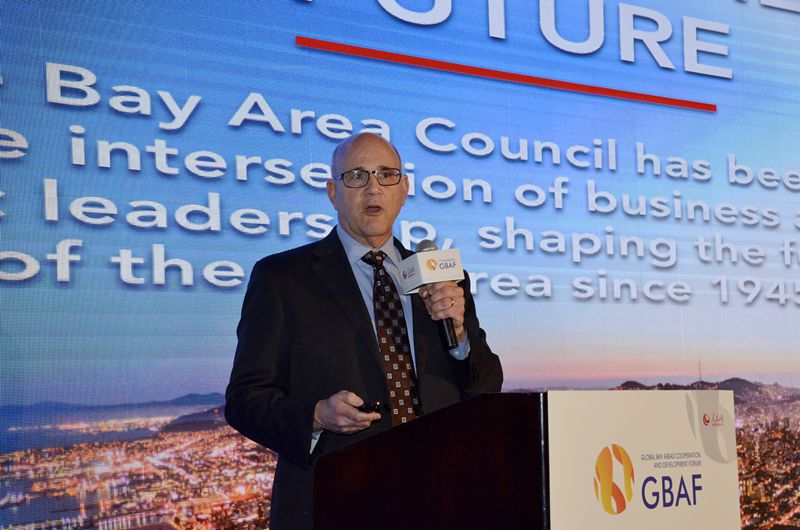


Jim Wunderman, President and CEO of the Bay Area Council, delivers a speech at the Global Bay Area Cooperation and Development Forum in San Francisco, the United States, on March 29, 2019. (Photo/People's Daily Online)
People's Daily Online, March 29 (San Francisco) -- Jim Wunderman, President and CEO of the Bay Area Council, discussed the role of non- governmental agencies in economic advancement at the Global Bay Area Cooperation and Development Forum on March 29, 2019.
The Bay Area Council is a public policy organization which has been at the intersection of business and civic leadership for over 70 years.
“If we were actually a country, this region called the San Francisco Bay Area of about 8.5 million people would be the 18th largest economy in the world,” Wunderman said as he addressed attendees at the forum. In the post-recession years, the bay area’s GDP growth has dramatically outpaced that of the entire US.
These, along with other statistics, are just a precursor to the sense of how profound a presence an internationally renowned bay area can have.
The Council’s initial formation was driven by the vision to coordinate regional economic development. Since 1945, the Council has sponsored legislation regarding environmentalism, cross-border relations, gender equity, and most notably, regional transportation systems.
"Our organization, the Bay Area Council, led an effort just last year to get the voters to approve billions of dollars of new funds to invest in more infrastructure to expand our various systems.”
One of the Council’s primary goals, justifiably shared by many regions, is to create a sustainable and robust economy. Though the bay areas are not the only ones to take the initiative, they’ve undoubtedly over-performed. In the San Francisco Bay Area, high-tech leads the economy. It has delivered the invention of the semiconductor industry, biotechnology, the internet, and social media. Now Wunderman hopes to focus and collaborate on issues of housing, transportation, and homelessness.
According to Wunderman, “San Francisco has a population that's willing to invest. I think that's very, very important. On the whole, there's been pretty good leadership so when we have a problem, we're able to get people to come together and have a conversation about it. Our industries are very intertwined and well-networked, which is one of the reasons why there's been so much technological innovation here. The San Francisco Bay Area is like one big shared platform, and people are not in their corner just doing their own thing; they're working together.”
When addressing development, cooperation is necessary to form an efficient approach. Though the world is at a pivotal moment where we are encountering problems facing economic globalization, following along a trend of increasing exclusivity would be the wrong path. Referring to the efforts of the forum, Wunderman says, “This movement of all the greater bay areas can lead the way for rethinking strategy and encourage people to work together.”
Wunderman was positive about the Guangdong-Hong Kong-Macao Greater Bay Area, and noted that he was particularly impressed by the infrastructure. On the Global Bay Area Cooperation and Development Forum, he responded, “I think this is a really good idea, and we should definitely encourage it.”

 Award-winning photos show poverty reduction achievements in NE China's Jilin province
Award-winning photos show poverty reduction achievements in NE China's Jilin province People dance to greet advent of New Year in Ameiqituo Town, Guizhou
People dance to greet advent of New Year in Ameiqituo Town, Guizhou Fire brigade in Shanghai holds group wedding
Fire brigade in Shanghai holds group wedding Tourists enjoy ice sculptures in Datan Town, north China
Tourists enjoy ice sculptures in Datan Town, north China Sunset scenery of Dayan Pagoda in Xi'an
Sunset scenery of Dayan Pagoda in Xi'an Tourists have fun at scenic spot in Nanlong Town, NW China
Tourists have fun at scenic spot in Nanlong Town, NW China Harbin attracts tourists by making best use of ice in winter
Harbin attracts tourists by making best use of ice in winter In pics: FIS Alpine Ski Women's World Cup Slalom
In pics: FIS Alpine Ski Women's World Cup Slalom Black-necked cranes rest at reservoir in Lhunzhub County, Lhasa
Black-necked cranes rest at reservoir in Lhunzhub County, Lhasa China's FAST telescope will be available to foreign scientists in April
China's FAST telescope will be available to foreign scientists in April